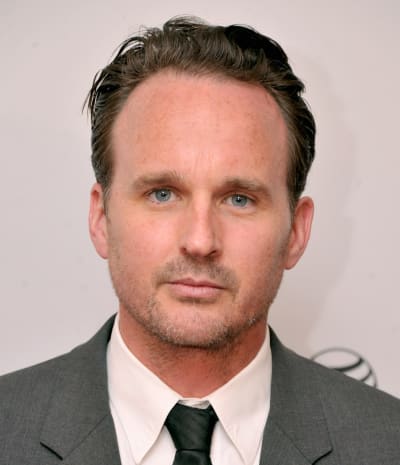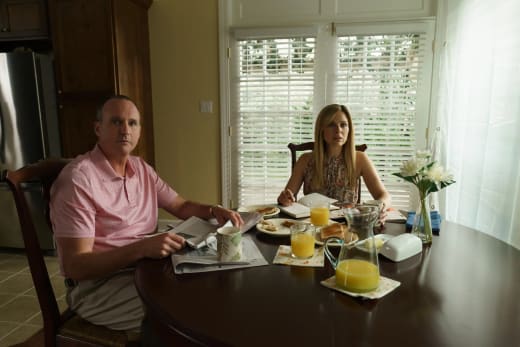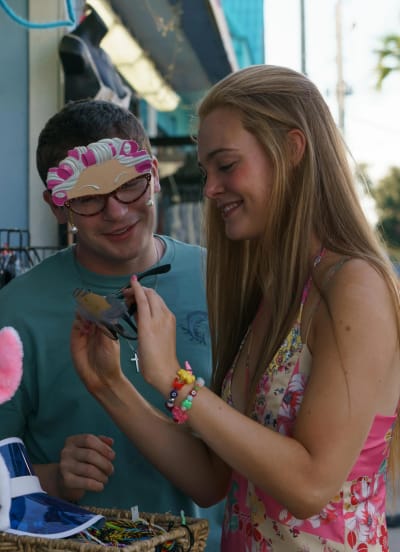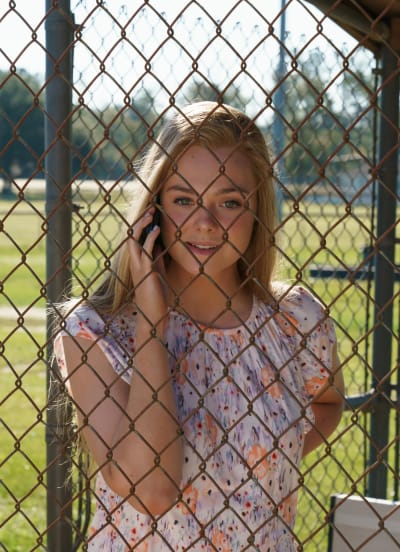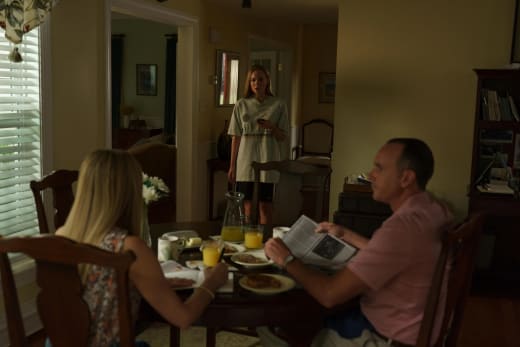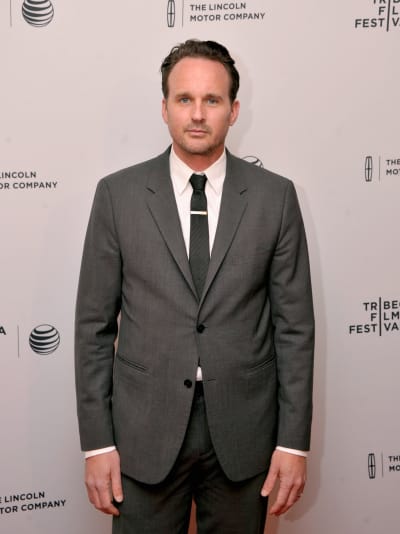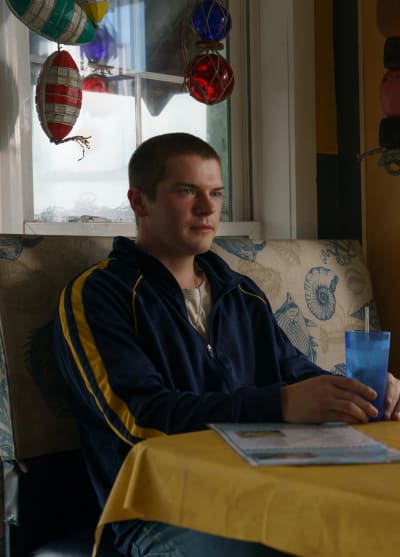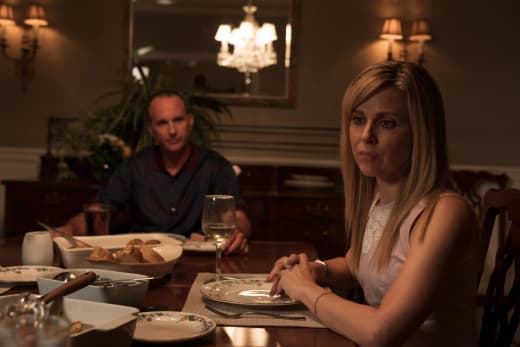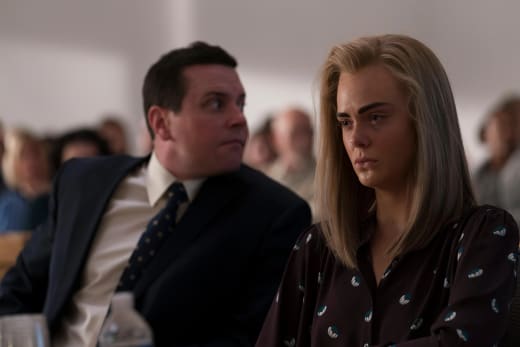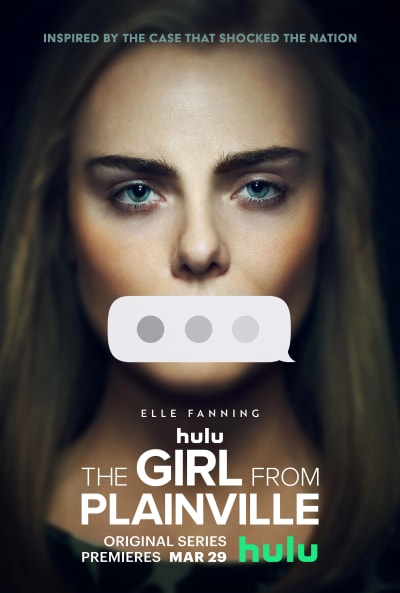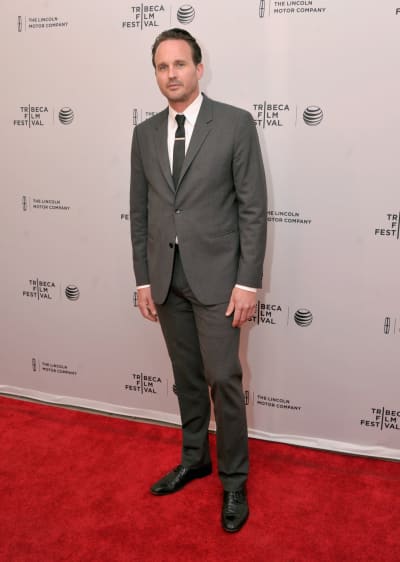
In The Girl From Plainville, Kai Lennox stars as David Carter, father to Elle Fanning’s Michelle Carter.
It’s a gripping and tragic tale of two ordinary teens who cling to each other like life rafts to weather the teen angst that threatens them daily.
In this case, they do not buoy each other, as Conrad Roy, a boy with whom Michelle has an online relationship, commits suicide, which she urges.
We had a chance to talk with Kai to get his perspective on the tough role and the compassionate way the story unfolds.
Hi, Kai. It’s so nice to meet you.
Nice to meet you as well. Thanks for speaking with me.
Absolutely. I really, as much as you can enjoy a series like The Girl From Plainville, I enjoyed the experience of watching it, shall we say.
Oh, good.
It’s definitely not an enjoyable story.
Yeah. I know. It’s a really heavy topic to take on. When I first encountered the story, obviously when it was in the news, I avoided it at all costs, just because as a parent, I was like, I can’t, this is just unfathomable.
And I just was like, that’s not something I want to have in my thinking as a parent, that’s possible. It was horrifying. And then, lo and behold, this project comes up. And I was like, wow, this is really something I need to look at.
And thankfully, I think Liz Hannah and Patrick Macmanus wrote some incredible scripts. And I think it was an opportunity to delve into this topic in a way that’s really meaningful. So, there’s something to be said about that.
So when you first experienced this in the news, and you wanted to keep away from it, how were you looking at it? I know you say it’s horrific, and you can’t even imagine it happening. Is that from both sides?
Yeah, yeah.
As a parent, were you looking at it as you wouldn’t want to be involved on either side? And did one of them affect you may be more than another?
In both instances, I think, and I hesitate to say there’s an equivalent fear, but there’s definitely that feeling of the deep despair that I felt around the Roy family and what their experience must have been.
And also, on the other end, I know when my kids came up, and they came up through this sort of period of this sort of beginning of social media and text being the most utilized method of connecting with people.
I was acutely aware of any time something would be happening with them, with my kids in particular, whether it was something that they were receiving, some negative input, or if they were involved in giving. Fortunately, I had contact with my kids, parents, friends, and such.
And so, we were able to sort of figure out what the best possible course of action was in helping our kids to move through these things. I think in the case of this unfortunate story, they were in a vacuum, and they didn’t have those resources.
They didn’t have the family awareness, and frankly, neither one of the families knew that they were in this relationship together. So for me, I think to answer your question, I felt very, very moved by both sides of this story. There’s not much else to say. I think you even said it.
It’s not something that’s enjoyable in content necessarily, in the sense that this is not popcorn entertainment, fold-your-laundry TV. Hopefully, this is a thoughtful discourse on a very important topic.
And I think it manages to do what the press wasn’t able to do, which is to paint a nuanced and complicated story about two young kids who were struggling in their own ways and kind of got caught up in something that was beyond their understanding.
Mm-hmm. Absolutely.
And the series really brings that out. And I think in different hands, it could have been a much different scenario.
Yeah. I completely agree. And I think it was really important that Liz Hannah and Patrick Macmanus were very careful to include the American Foundation for Suicide Prevention, the National Eating Disorder Association, to help sort of piece together the best way to tell the story without it sensationalizing the topic and the bigger themes.
So tell me a little bit about David Carter from your perspective.
Well, so as you may or may not know there isn’t a lot of information from the Carter family’s side. What I had as a source, which I think was very extensive, was the Esquire article by Jesse Barron. That was essential. There was so much there to glean.
Also, Erin Lee Carr’s documentary, I Love You, Now Die, I think that was one of the first references we got from production. In fact, I might have even gotten that with the audition, like “Watch this, inform yourself.”
And again, I mean, talk about … It took me a couple of times to get to through the documentary, just because of that same feeling, that visceral response to the heartbreak of this story.
And so, David Carter, for me ultimately became a mixture of drawing from the sources that we had. And also, the scripts that Liz and Patrick wrote were just so good. And so, I used what I could in that and my own experiences being a parent.
My whole goal with this was to come at it with compassion and empathy and to do my best, not to have judgment one way or the other, but just to be in a place of total empathy and hopefully bring some dignity to David Carter to this family.
And also, I think I was equally motivated by the sort of sense of everyone on the show to steer away from sensationalizing or turning anything into a caricature, but just trying to be as truthful and authentic as possible within the given circumstances.
It must be difficult to play a character when he’s a person as much as he’s a character that you have to play. Is it challenging to be involved in this kind of production whenever there isn’t buy-in from the family? Does that affect the way that you portray him?
Yeah. It definitely is a major consideration. And I think under the circumstances, our goal here was this is not a documentary. Much of the show is dramatized, and there are certain fictionalized characters. This is based on the true event.
So we did our best to pay homage to this family, to make sure that we weren’t taking their lives for granted or trivializing it in any way, but hopefully just offering our interpretation of what that experience might be.
In any story that you’re telling where the people you’re portraying are still living, I believe it is important to be mindful of going into it with integrity and honesty.
Sure. And that’s what’s different about this. Pam and Tommy is also out there and Winning Time. There are quite a few adaptations out there of real-life events that do not have involvement from the parties involved.
These are just regular people, which makes it seem like you would have a higher burden to do these people justice.
Right, indeed. Because they haven’t been exposed to all of the sort of media fires that those others have in Pam and Tommy, and Winning Time. There’s definitely a lot of media that already exists around that. It is not that it justifies exploitation, but there is a definite weight to make sure that we do justice to these people.
And do you think overall that the story has treated Michelle and Conrad’s family fairly?
Gosh, I don’t know that I could honestly speak to that in a way. I hope that they see this, and if they do see this, they feel that the responsibility of doing just that, of treating them with respect and integrity, was really thought about and executed in a way that they would approve of.
So it’s hard to know. I couldn’t say whether or not how they would feel about it.
But I think ultimately the goal was to paint a bigger picture than what the media had portrayed at the time and sort of put into context the emotional logic and the sort of events that led to the tragic loss of Conrad Roy the Third and how Michelle Carter could have gotten to the point where this was something that could happen.
Right. But you think it’s interesting that traditional journalism and what people always looked to in the past as the news kind of doesn’t do their job anymore. It’s left up to podcasters and television productions to level the playing field and tell a story in a far more nuanced way.
It’s so interesting how things have changed, whereas television used to be salacious, for lack of a better word. They’re moving in a completely different direction now.
Right. And I think on that point when you’re able to get into to a character-driven story that — like in the news, typically, or the tabloids — you’re given the salacious version of everything. Everything is heightened, and everything feels sort of inhuman in a way.
And I think this kind of storytelling like you said, podcasts or TV shows, it’s an opportunity to dip into the narrative in a way that can be more expressive and hopefully more nuanced and truthful.
It seems to be working.
Well, and people are responding, I feel like that the true crime genre has become what it has is, I think, an indication that this is what people are looking for, some sort of exploration of the human condition, I guess.
That’s a good way to put it. So Elle Fanning was pretty incredible as Michelle. What was it like working with her?
She’s a joy. I’m just so blown away by her work ethic and commitment to the role. She has just such an incredible range. She’s present; she’s generous. Yeah, she’s literally one of the most marvelous people to work with, and we had a great time.
Also, I think what’s so incredible is that she’s very conscientious. And particularly with this role in this character, I think it was really important to her to make sure that she did not sensationalize this character, but she brought to it an honesty.
And hopefully, in doing so, she’s kind of offering a character that will hopefully ignite some sort of discourse around mental health. And I think she was very mindful of that the whole time.
And to speak of her ability. Like she would walk on to set and greet everybody and a total joy. And the cameras would roll, and she would step on her mark. And it was just, you saw the change. She is really so very talented. So it was a pleasure.
And if you look at the difference between her on The Great and playing Michelle, I mean, it’s almost like they’re two completely different people.
Oh, completely. I know. It’s mesmerizing. And even while we were working on this, she would go into hair and makeup and come out, and everyone would stop on set because her transformation physically with hair makeup and wardrobe was just staggering. And then she just embodied her physically, in a way that was sort of uncanny.
Yeah, and to see the Catherine the Great character, and then Michelle Carter, it’s really inspiring as an actor.
And what have you been watching on TV? Do you have time to watch it? And what do you like?
Yeah. Actually, I’ve just been sort of engrossed with Severance. I think it’s pretty great. It’s really strange and kind of engaging, in a way that feels like a Jean-Paul Sartre play or something.
It just seems like it would be so easy to fall into that way of life if we weren’t paying attention.
For sure. For sure. For sure. But yeah, I love a good show. It seems like the art form of episodic TV has really taken on a new level of greatness in some of the good ones.
Yeah, it really does. How do you choose your roles?
Gosh, I wish I could say that I did choose them. I feel just very fortunate to get to go to work whenever I’m hired. I audition and read scripts and semi-fall in love with, and don’t get, and semi-fall in love with and do get.
And this is one of those opportunities that when I first read the scripts prior to the auditions, I was so moved. And everyone involved, I mean, it couldn’t be a more incredible group of people, just so thoughtful, so conscientious, so bright.
And so, getting an opportunity to work with a group of people like this is momentous for me as an actor. I feel like it’s a really shiny moment. I’m very proud of this show and of these people and really grateful for this opportunity.
And do you have anything else coming up? Any irons in the fire?
I got to work on an incredible film starring Thandiwe Newton that premiered at Sundance, directed by Julian Higgins, called God’s Country. Really, just such another sort of profound story.
And talk about another godlike force of nature when it comes to acting; Thandiwe is just such a brilliant human. I think that picture will be released in the fall of this year. IFC Films picked it up, which was great. I’m looking forward to seeing how the world responds to that film.
Oh, I see Jefferson White was in that.
Yes. Yes.
He’s from the Yellowstone universe, where he has literally had just gold dust scattered across him.
Absolutely. Yeah. He’s great. He was excellent. We shot that in Montana, and he had been working a lot in that area on Yellowstone. And yeah, it was a great group of people. Again, we had Jefferson White and Joris Jarsky, who are just phenomenal. It was really a special show. And we almost got shut down.
I mean, we were March 20, 22 weeks into production, and pandemic hit, and we were like, “Oh, that’s it. See you later.”
And then a full year later, thanks to really, really gracious producers and investors, they held onto us. And we were able to finish and turn it in and got accepted to Sundance and had a premiered slot there. So it was really, really charmed.
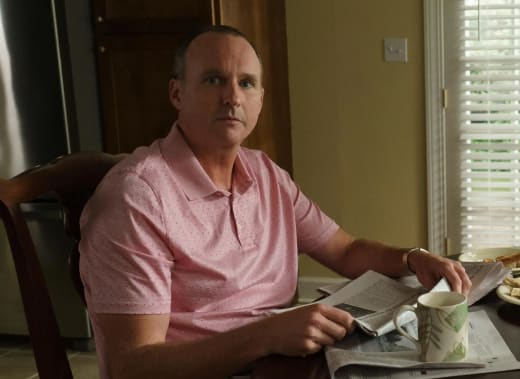
How was it received at Sundance?
It was received great. It really, really was. It was one of the favorites. Unfortunately, we couldn’t be there in person to celebrate its success, but it was like two weeks before Sundance was going to happen that they had to cancel everything with omicron.
Be sure to tune into The Girl From Plainville on Hulu beginning on Tuesday, March 29.
Carissa Pavlica is the managing editor and a staff writer and critic for TV Fanatic. She’s a member of the Critic’s Choice Association, enjoys mentoring writers, conversing with cats, and passionately discussing the nuances of television and film with anyone who will listen. Follow her on Twitter and email her here at TV Fanatic.
